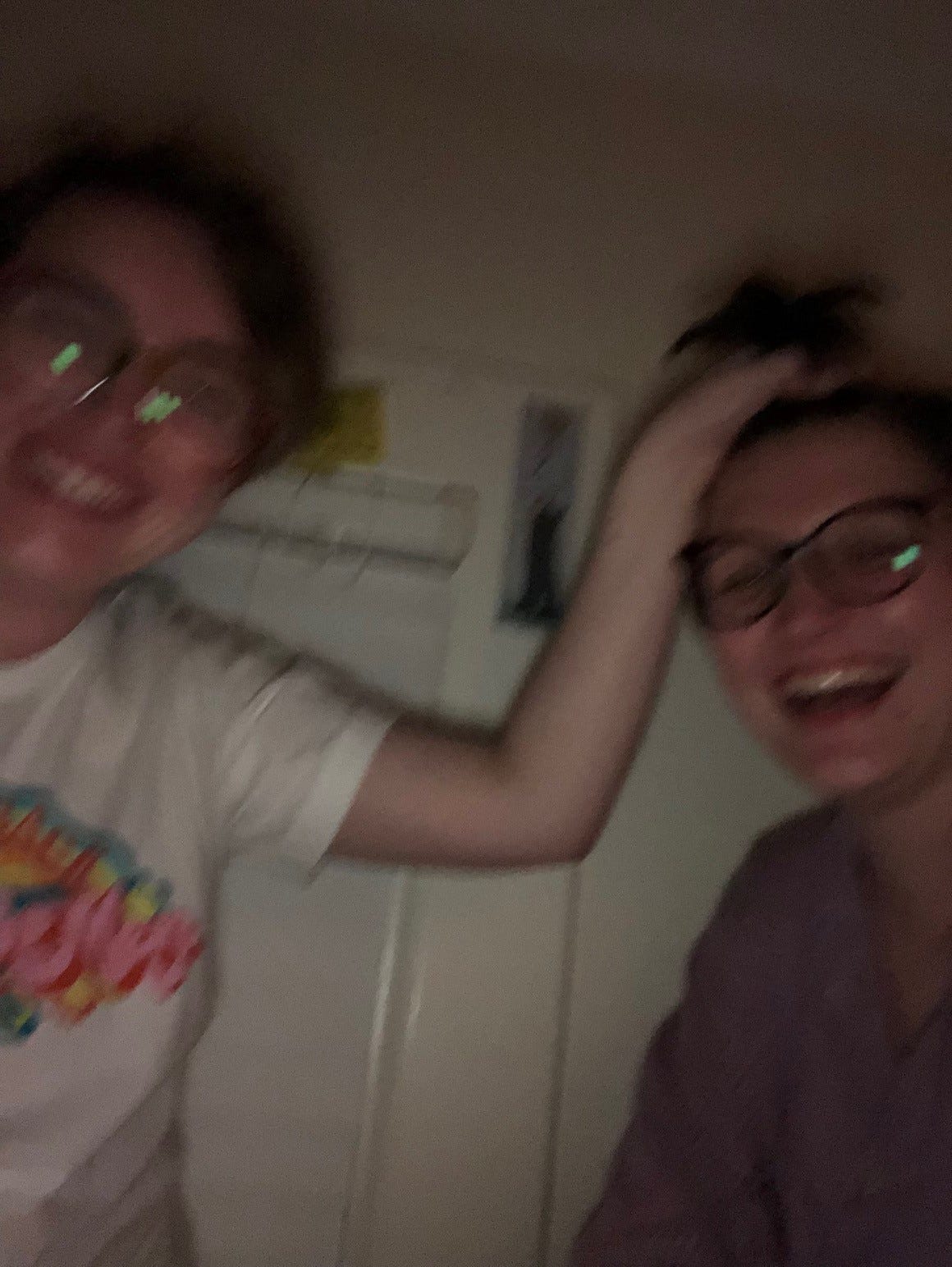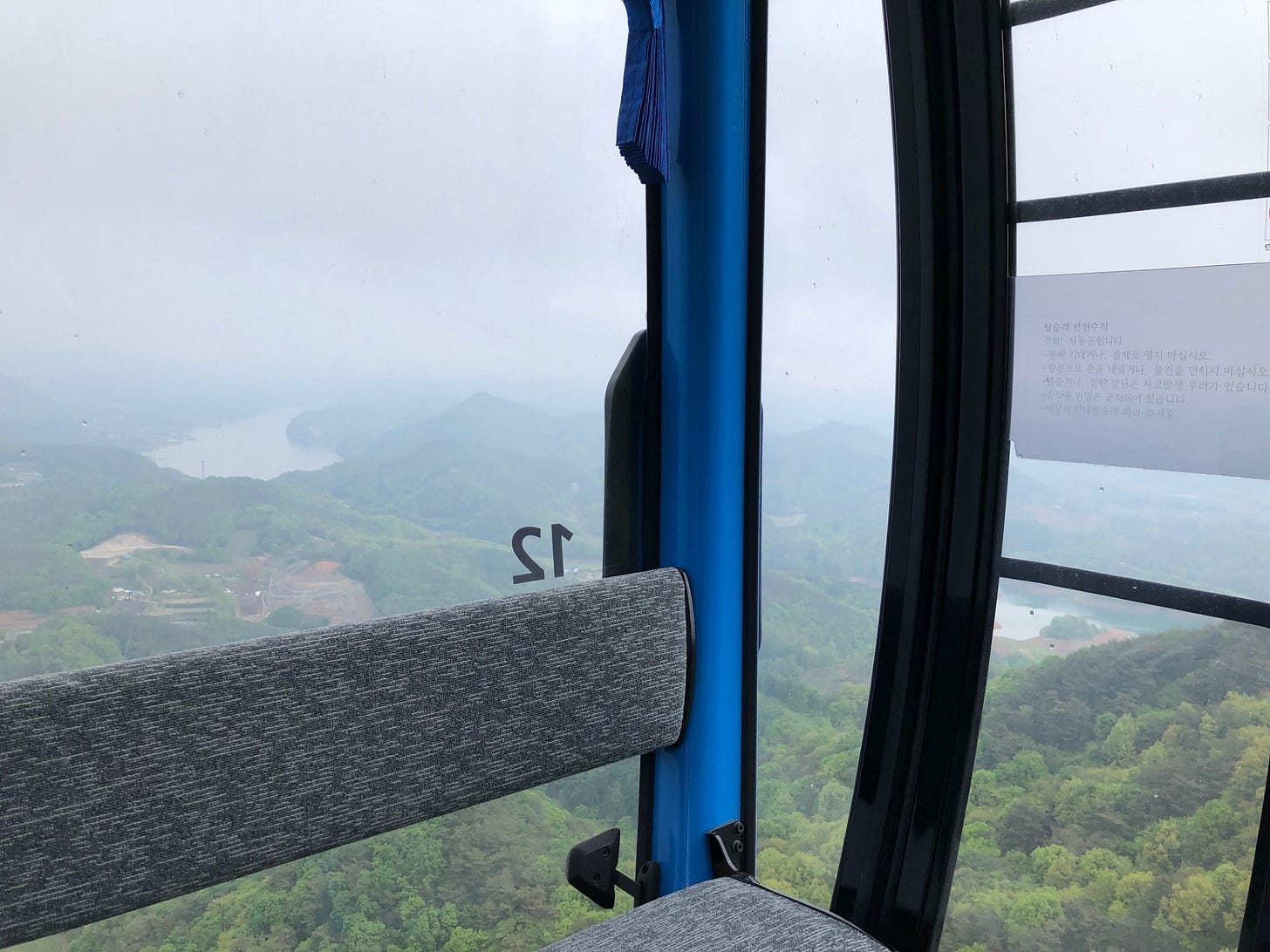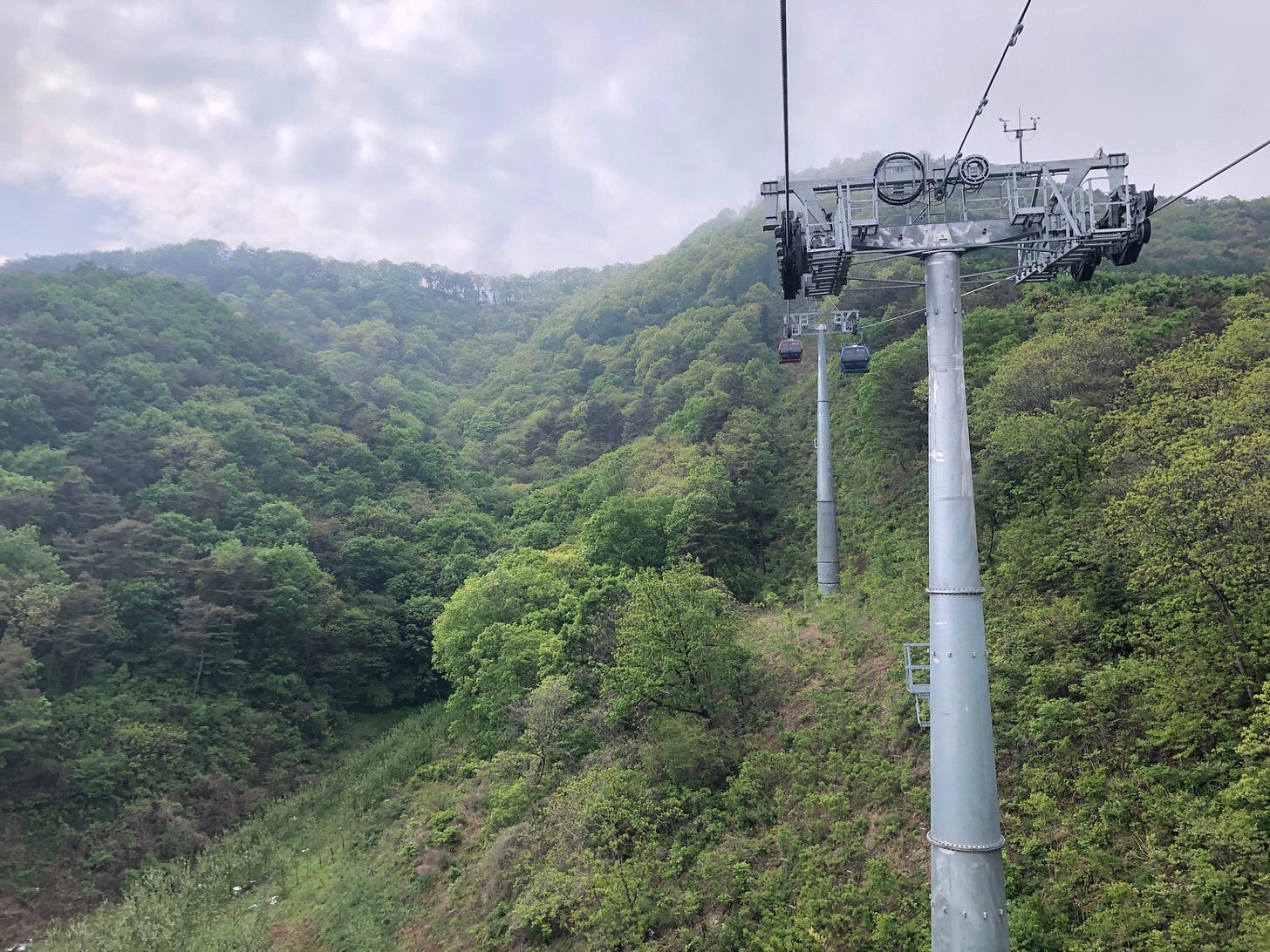A note: I’m still experiencing pretty intense burnout, so this week’s newsletter might not be up to my absurd standards. I appreciate your patience as I work within my limited capacity so that I can spend more energy on restorative activities. Not that I don’t love writing my newsletter—it just takes a lot of time and energy each week! That being said, off we go.
In the car today, Zoe and I were talking about travel. Specifically, we were talking about the idea that people should do the bulk of their traveling before they have kids.
Neither of us agrees with that idea, for a few reasons.
In general, I think (white, upper-middle class) vacation culture is inextricably linked to drinking culture. There’s this vague sense that if you aren’t at work, you should have a drink in hand. Especially if you’re a young adult, where social gatherings and booze go together like Marmalade and destroying plush toys. I don’t have an issue with drinking, not at all—I enjoy most things fruity and boozy. But I’m also mindful of having an addictive personality and needing to be super cognizant of what—and why—I’m drinking.

I also think that the idea of needing to do things like travel before you have children just sets people up for a lot of potential frustration and grief. It doesn’t seem to serve anyone to frame having a child as a punctuating event, an end to things you want to do. It frames pleasure as finite and having children as unpleasurable. Certainly, people have their own feelings about having kids and whether that’s something they want. As they should! But the decision whether or not to have a kid shouldn’t be overly influenced by a cultural conception of parenthood as a sacrifice of fun.
Most specifically though, Zoe and I both have decisively family-friendly travel aspirations anyway. We want to see old architecture and museums, to eat ice cream and go to bed early. None of that sounds like something you couldn’t do with a kid. In fact, they’re experiences that we’d want to share with a kid.

When I lived in South Korea, my family went on trips with another family who had much younger children. Traveling with them was always such a pleasure. Seeing how the kids experienced cable car rides, Korean cuisine, aquariums, and more filled me with joy.
At one hotel, my sister and I babysat the kids so their parents and ours could go out to dinner together. We ordered chicken from the hotel restaurant; when it was time to go pick it up, the youngest was upset and didn’t want me to leave, so I brought him with me. Navigating the hotel and talking to Korean guests while carrying a toddler in footie pajamas on my hip—they all thought he was adorable, about which they were completely correct—stands out in my mind as the moment I realized I wanted to be a parent.

Before I had the language to understand my transmasculinity, what I knew for certain was that I never wanted to be pregnant. I was uncomfortable with all things uterus. Beyond the ideas of the discomfort of pregnancy or pain during childbirth, there was an inarticulable knowing: I could never be a pregnant person.
With that in mind, it was easy for me to, as an openly trans adult, start gender-affirming hormone therapy without being concerned about how taking testosterone would affect my reproductive system. The public discourse about gender-affirming care includes the talking point that such care is life-saving. I’m a testament to that; though it isn’t the case for every trans person, it is the case for me that medical transition has been necessary for me to find comfort and confidence in my body. Ensuring that I can continue to access gender-affirming care is fundamental to how Zoe and I make life decisions like where we will live because the improvements to my physical and mental health are vital to my wellbeing.
So, when it comes to thinking about having a kid someday, Zoe and I aren’t considering whether it might stop us from taking a trip to France.
Instead, we talk about making sure we live somewhere that provides legal protections for non-biological parents and is a safe place for queer people to start a family, about finding a gender-affirming medical team, about our mental health and how the process of becoming parents might impact it.
Why would we give a shit about whether flying with a kid would be a pain? When we decide to expand our family, we’ll do so knowing that we’ll get to share our lives with a tiny person whom we’ll love unconditionally.
If Paris is the City of Love, then shouldn’t that future person be there with us?
Separate but unequal. At Bunnell Elementary School in Flagler County, Florida, a recent assembly for fourth- and fifth-graders was intended to encourage better performance on standardized tests. Not all of the school’s fourth- and fifth-graders, though—just the Black students. The PowerPoint presentation used in the assembly included the promise of McDonald’s or Chick-fil-a as an incentive for students who get higher scores, and two parents said their kids were told that if they didn’t do well on their tests, they might end up in jail or killed. Fucking horrific.
Lashaika Moore, the interim superintendent, said “It is clear there was no malice intended in planning this student outreach. However, sometimes, when you try to think ‘outside the box,’ you forget why the box is there.” Since when is the box not being racist? As far as I know, when people say they’re going to think outside the box, they mean they’re going to change up the font in their social media infographics, not that they’re going to racially profile children.
Genuine question: does anyone still feel shocked when this shit happens? Like, even a little bit? Maybe it’s just a sign that my upbringing was so inattentive to racism—I was definitely taught the American mythos of progress marching ever-forward, leaving racism in the 1960s—that stories like these used to shock me. So, yeah, it could be a product of me having unlearned a lot of bullshit and paying much more attention now than I did when I was younger.
But I also feel like this kind of overt, clear-cut racism is happening with increasing frequency, much like other forms of violence (I’m thinking particularly of police brutality and mass shootings here). Part of that, to be sure, is because of the proliferation of “reporting” on social media—local news articles shared on Instagram stories reaching people in other states, bystander footage going viral, journalistic publications increasing their social media presences. Of course it feels like this shit is happening more often; we’re exposed to these stories from people and places further removed from our lived experiences than ever before. That being said, it doesn’t just feel like it’s happening more often—it is happening more often.
When we’re bombarded with traumatic stories at all hours of the day, we become desensitized to what we’re seeing. The Overton window shifts as we become accustomed to certain forms of violence; the previously unthinkable gradually becomes acceptable. This doesn’t happen to everyone—take Zoe, for example, who consistently critiques my truly awful timing for sharing terrible news, which I can’t seem to help because the horror they feel so acutely has grown muted for me. I don’t know how to get back to the space Zoe occupies, but I long to be there because I think it’s the only way for us to resist the encroachment of fascism. We can’t let ourselves grow tolerant of racism, transphobia, homophobia, sexism. We can’t dissociate. As painful as it is, we have to persist in being horrified by the horrific.
Barbie versus Bottoms. In an effort to convince Zoe that we should see Bottoms in theaters when it comes out (September 1!), I read the New York Magazine cover story on Emma Seligman, Rachel Sennott, and Ayo Edebiri aloud to them. Zoe is officially sold on it; who can resist the idea of a horny, incel lesbian fight-club comedy that’s queering the Superbad-esque subgenre?
What I found interesting was that the profile referenced Superbad, like the comparison of the characters PJ (Sennott) and Josie (Edebiri) to Seth (Jonah Hill) and Evan (Michael Cera), but didn’t interrogate the comparative politics of the films. Instead, that sort of sociocultural conversation was focused—albeit briefly—on how Bottoms compares to Barbie:
“Bottoms is a fascinating counterpoint to the Hillary-core, girlboss feminism of its immediate predecessor, Barbie, challenging the idea that women are unilaterally good, that they can measure or even prove that goodness by, say, winning a Pulitzer Prize or being an ‘ordinary mom,’ or that this goodness means they deserve gender equality. Josie and PJ turn that sort of 2016 feministspeak on its head, exploit it for their own benefit, and incidentally expose it for the frail, condescending argument that it is.”
Rachel Handler, the journalist who profiled the Seligman, Sennott, and Edebiri, evidently has some strong feelings about Barbie. To some extent, I agree with Handler’s point; there’s a centrist quality to the feminist politics of Greta Gerwig’s film, including a gender binary so heavily stereotyped that it feels almost cartoonish (which, I suppose, is sort of the whole point of Barbieland). Zoe and I have talked at length about Barbie’s failure to adequately address the harm perpetuated by the Barbies that contributed to the Kens’ descent down the alt-right pipeline. And, no, I’m not talking about Barbie Margot romantically rejecting Ken Ryan—a popular scapegoat that men use to justify all sorts of shitty behaviors. Barbieland begins as a matriarchy which subjugates the Kens and denies them the space to experience and express emotions, and by the end of the film, the Barbies don’t acknowledge any wrongdoing on their parts and offer the Kens incredibly limited government representation, which doesn’t read as “gender equality” to me. And, like I said, the gender binary is drawn with such a heavy hand that any gender-nonconforming person (Zoe and myself included) look to Allan for any scraps of representation. Not to mention Kate McKinnon’s Weird Barbie having one of the film’s horniest lines in reference to… Ken? For some reason? Because we can’t have a lesbian Barbie (Lesbarbie? Lesbie?), apparently.
All that being said, I still love Barbie, and I don’t think it’s fair to say that the movie’s politics amount to a “frail, condescending argument.” I understand the temptation, of course. But why do the two movies and their ideological slants have to be positioned in opposition to each other? After all, everyone’s beliefs start somewhere. I would love to meet a feminist under thirty who completely skipped over “Hillary-core, girlboss feminism.” The politics of Bottoms wouldn’t exist without the politics of Barbie—after all, Handler positions Bottoms as reactionary. Instead of interpreting them as oppositional, why not consider them stepping stones on an ever-evolving path toward a liberated society?
Anyway. I’m excited to see Bottoms.
Comic relief. The last thing I’ve got for you in this section is a TikTok that Zoe and I have been cry-laughing about all weekend. Check it out here.
On my mind and on my heart today are the three people who lost their lives in Jacksonville on August 26 in an act of racist violence. I am filled with grief for the Black community in Jacksonville and rage directed at the systems and people who continue to uphold white supremacy and who at best don’t care whether people live or die. I encourage white individuals to identify and act on ways that they can use the privilege from which they’ve benefited to support and uplift Black individuals and communities, now and always.
Slowly but surely, I am embarking on a new quilting journey! Fabric selections have been made and paired for half square triangles, which means it’s time to start cutting and sewing. Zoe’s going to teach me how to use the sewing machine, so I’ll hopefully have a quilt top by winter so that I can spend the chilly, dark season in my apartment, cozily hand-quilting with a mug of tea and a comforting movie.
Zoe and I went over to our friends’ place last week for tea and coffee after work, and it was such a delight to spend a few hours in pleasant company, talking and laughing together.
Since the Trump mugshot came out, Zoe has (adorably) attempted to make the same face. As you can see below, they just can’t seem to pull off the cruel, evil vibe:

Image Description: A closeup of Zoe, a nonbinary person with dark brown hair, brown eyes, and shockingly thin eyebrows. Their head is tilted forward in an attempt to mimic Donald Trump’s mugshot. Their cheeks, also known as jellies, are too cute and round to manage any malicious expression. Plus, they can’t help but smile. So, really, they’re just making what they call their “devil-o” face, which is how we refer to the purple smiling devil emoji.








